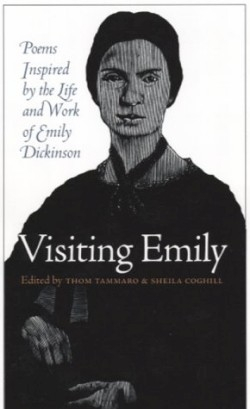Visiting Emily
Poems Inspired by the Life and Work of Emily Dickinson
For many, to be a poet is to love Emily Dickinson. There is an inevitability to this affair, and her influence on American poetry elicits a form of worship in the poems written to, for, and because of her. This slim, but weighty anthology offers evidence of her influence, bringing together eighty American poets in recognition of her 170th birthday to be celebrated in December 2000.
Male poets are particularly fond of Emily, as she is often referenced (for there is no other such Emily in American letters). For them, she is not only muse, but an erotic ideal; a source of inexhaustible desire, and therefore a wellspring for many poems.
In “Taking Off Emily Dickinson’s Clothes,” Billy Collins writes: “The complexity of women’s undergarments / in nineteenth-century America / is not to be waved off, / and I proceeded like a polar explorer / through clips, clasps, and moorings, / catches, straps, and whalebone stays, / sailing toward the iceberg of her nakedness.” At first one hesitates at the presumption of such imaginings, the way her life is revised in favor of the sexual freedom she would have never know when she was alive. Then this is her power over her admirers, and perhaps she would wholly approve—such imaginary leaps having been her own survival and source as a poet.
Echoes of Dickinson’s style and themes are evident throughout the collection: dashes and spacings like those she employed, and words and images that remember her verses are interwoven and sampled with copious references to black carriages, cupolas, her white dress and “feathered Hope.” Her home in Amherst, Massachusetts, is a place of pilgrimage, and references to Death and Darkness bring the reader into her world, which still persists as a landscape of spiritual and poetic richness.
What is sought, it seems, is a dialogue with the woman who is described by Robert Bly in the foreword as a warrior who “goes into battle covered with blood. This is not someone who stands around waiting for reinforcements to arrive. She doesn’t wait for a male minister to tell her that it is time to travel toward God.” In other words, her fearlessness is worth drawing nearer to, as many have, and others will when they encounter her in this homage.
Reviewed by
Holly Wren Spaulding
Disclosure: This article is not an endorsement, but a review. The publisher of this book provided free copies of the book to have their book reviewed by a professional reviewer. No fee was paid by the publisher for this review. Foreword Reviews only recommends books that we love. Foreword Magazine, Inc. is disclosing this in accordance with the Federal Trade Commission’s 16 CFR, Part 255.

